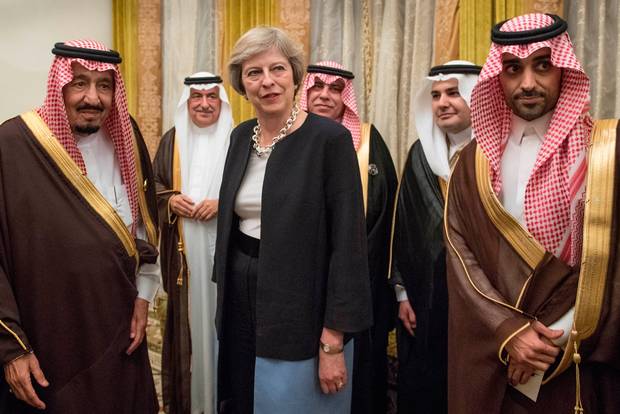Since Saudi Arabia entered the conflict in Yemen in March 2015 and began to conduct airstrikes, the British government has sold the kingdom more than £3.6 billion worth of arms. Throughout the duration of its involvement in the conflict, the Saudi-led Coalition in Yemen (formed by Saudi Arabia and other Gulf countries, such as Kuwait, United Arab Emirates, Bahrain, as well as Egypt) has used these arms to launch thousands of airstrikes, including attacks that have killed a documented 13,800 Yemeni civilians. As a result, Saudi Arabia and its coalition partners have been accused of attacks which may amount to war crimes and that are exacerbating an ongoing humanitarian crisis. Because of its role materially supporting Saudi Arabia’s actions, the UK has been accused of complicity in the kingdom’s alleged war crimes.
The United Kingdom has been a major arms dealer to Saudi Arabia since the 1960s. The first UK-Saudi arms deal dates back to 1965, when the British Aircraft Corporation (BAC) supplied Saudi Arabia with Lightning and Strikemaster planes for £207million. Since 2015, the UK has licensed over £2.2 billion in planes, helicopters and drones to the kingdom in addition to £1.1 billion in bombs, grenades, and missiles and £430,000 worth of tanks and armored vehicles. The Campaign Against Arms Trade (CAAT) asserts that the British government is intimately involved in these deals because they are operated through Government-to-Government contracts. Saudi Arabia has used these arms, including bombs and cluster munitions, in allegedly unlawful attacks on the Yemeni population.
The perception that the UK government is supporting Saudi Arabia’s rights violations in Yemen is bolstered by its hosting of the Defence & Security Equipment International (DSEI). DSEI is the world’s largest arms trade fair, which takes place in London every September amid protests from activist groups who believe some of the invitees, including Saudi Arabia, would use the products to commit war crimes and other human rights violations. DSEI has traditionally been condemned by the local government and different anti-arms trade groups and is surrounded by controversy due to the sale of cluster bombs despite an international ban on the munitions, as well as the presence of dictatorships and human rights abusers.
Addressing the use of British munitions in the Yemen war and the UK’s possible complicity in Saudi war crimes, two UK Parliamentary Committees, the Business, Innovation and Skills and International Development Committee and the Foreign Affairs Committee, raised their concerns and called for the suspension of all arms sales until an independent inquiry had looked into the alleged violations of international law. In addition to the Committees’ concerns, CAAT petitioned the UK High Court to halt the sale of weapons on the grounds that the sales violated UK arms exports criteria. Despite this, the High Court ruled against CAAT’s petition and sided with the government, concluding that the Saudi-led coalition was not deliberately targeting civilians in its attacks. In its conclusions, the High Court also decided that the coalition had adequate processes and procedures in place to ensure respect for the principles of International Humanitarian Law and, furthermore, that Saudi Arabia was committed to complying with International Humanitarian Law. Thus, according to the ruling, there is “no ‘clear risk’ that there might be ‘serious violations’ of International Humanitarian Law (…) such that UK arms sales to Saudi Arabia should be suspended or cancelled.”
Even while it is deepening its material connections with Saudi Arabia through increased arms sales, the UK has approved licenses for arms deals to another 20 countries which are considered human rights abusers by the British government itself. Among these countries is Bahrain, which received £45 million worth of arms between February 2011 and September 2015, and established a British naval base as part of a defense agreement between both countries.
The arms trade between the UK and Bahrain has continued despite the systematic and violent suppression of political dissent since the peaceful pro-democracy movement of 2011. In April 2011, the UK government approved licenses to export body armor, direct view imaging equipment, training hand grenades, and small weapons. This trade has raised concerns about the potential use of the materiel to violently repress demonstrations in Bahrain. The deals between Manama and London have also included training for the Bahraini security forces and improving the performance of the kingdom’s supposed accountability mechanisms, such as the Ministry of Interior Ombudsman, the Special Investigations Unit, and the National Institute for Human Rights. Despite this training, Bahrain’s these institutions have repeatedly failed, or refused, to fulfil their mandates to address the systematic human rights abuses in Bahrain.
Despite the claims of the British government and High Court, the sale of arms to Saudi Arabia and other human rights abusers makes the UK actively complicit in their violations, including the Saudi-led coalition’s unlawful attacks on the Yemeni population and Bahrain’s violent crackdown on protestors. The UK government should immediately halt all arms sales to countries suspected of falling short of their international human rights commitments.
Juan Carmelo Rodríguez Melián is an Advocacy Intern at ADHRB.





